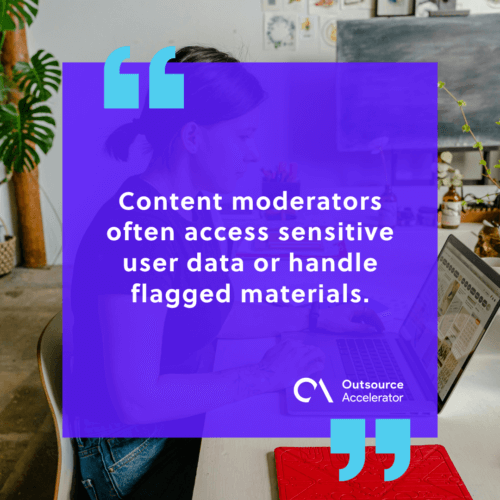Offshoring content moderation wisely: 8 do’s and don’ts for success

In an era dominated by online interaction, content moderation has become vital for protecting brands, fostering user trust, and maintaining a positive digital presence.
For businesses managing large volumes of user-generated content, effective moderation helps filter harmful, inappropriate, or off-brand material before it reaches the public.
As demand for round-the-clock oversight grows, many companies are now offshoring content moderation to trusted third-party providers, such as Sourcefit. This shift enables brands to remain agile, scale efficiently, and concentrate on core growth areas while experts manage the complexities of moderating online content.
In this blog, we’ll walk you through eight essential dos and don’ts when farming out content moderation wisely. Whether you’re just starting or looking to improve your current strategy, these practical tips will help you make smarter decisions that support long-term success.
4 Do’s of offshoring content moderation
Offshoring content moderation can help businesses stay responsive, scalable, and focused on growth. But success depends on making the right strategic moves from the start.
Here are four essential practices to follow when offshoring this function:
1. Choose a partner with industry experience
Work with a provider that understands your market. Sourcefit is known for having a seasoned team with relevant industry experience that will already know how to handle the types of content your platform receives.
Whether you run a marketplace, a social network, or a review site, an experienced partner can apply the right tone, context, and judgment when moderating content. This saves time and improves accuracy.

2. Define clear guidelines and expectations
Set the foundation with well-documented moderation rules. Define what counts as offensive, misleading, spam, or off-brand. Share detailed examples and context to help moderators make the right calls.
The more clearly you communicate your standards, the more consistent and aligned the moderation will be with your goals.
3. Prioritize communication and collaboration
Strong communication leads to better results. Maintain regular communication with your offshoring partner through frequent check-ins, ongoing feedback loops, and timely updates.
If your policies evolve or new content types emerge, keep the moderation team in the loop. Collaboration fosters trust and enables both parties to adapt quickly to changes.
4. Monitor quality and performance
Track key performance indicators like response time, accuracy rate, and flagged content trends. Regularly review these metrics with your provider to identify patterns, fix issues, and fine-tune processes.
Ongoing performance monitoring ensures that quality remains high and guarantees your brand’s standards are consistently met.
Following these four practices helps build a strong, effective relationship with your content moderation provider, one that protects your brand while keeping your online community safe and engaged.
4 Don’ts of offshoring content moderation
Offshoring content moderation can be highly effective, but only if you avoid common pitfalls. Poor decisions in the early stages can lead to reputational risks, inconsistent moderation, and wasted resources.
Now, let’s discuss the four mistakes to avoid when offshoring this function to experts:
1. Don’t rush the selection process
Choosing a content moderation provider is not a box to tick quickly. Take the time to research, compare, and evaluate several options. Look beyond cost. Consider experience, scalability, cultural fit, and technical capabilities.
A rushed decision often leads to weak partnerships and frequent problems down the road.
2. Don’t neglect training
Even the most experienced provider won’t understand your brand voice and moderation standards without proper onboarding. Provide detailed training sessions, brand guidelines, and context for different content types.
Skipping this step can result in inconsistent decisions and damage to user trust.
3. Don’t treat it as a “set and forget” function
Offshoring doesn’t mean you hand over control completely. Stay involved. Regular check-ins, feedback, and policy reviews are necessary to keep moderation aligned with your goals.
Ignoring this part can lead to miscommunication and a disconnect between your expectations and the team’s output.
4. Don’t overlook data security and compliance
Content moderators often access sensitive user data or handle flagged materials. Make sure your provider follows strict data protection practices and complies with relevant regulations.
Ignoring this area can expose your business to legal and reputational risks.
Avoiding these common mistakes helps businesses build strong, productive relationships with their content moderation partners.
It also keeps your platform safer, your users happier, and your brand reputation intact. With the right approach, offshoring content moderation can become a powerful tool for sustainable growth.

Work with skilled and experienced content moderators from Sourcefit
Partner with Sourcefit to connect with dedicated content moderation experts who will protect your brand and support your growth. Its team of specialists brings industry-specific experience, fast response times, and consistent quality.
Create safer, more engaging digital spaces! Visit Sourcefit’s website today to learn more about how its customized solutions can boost your content moderation strategy.







 Independent
Independent




